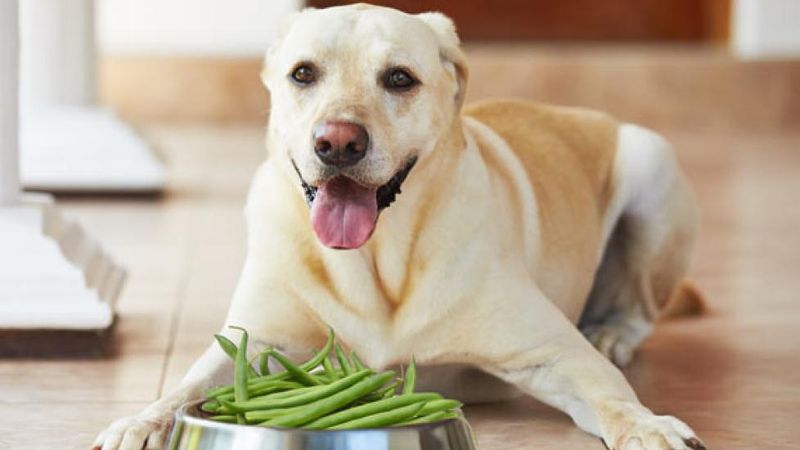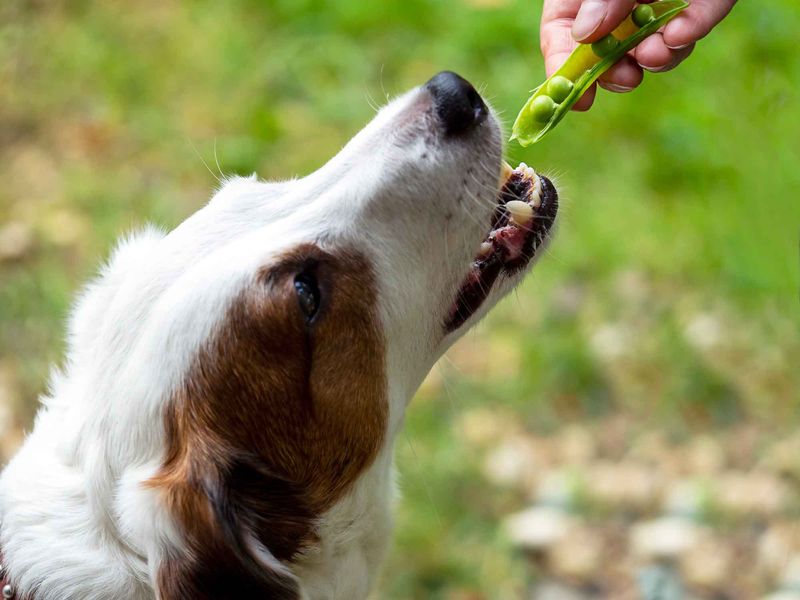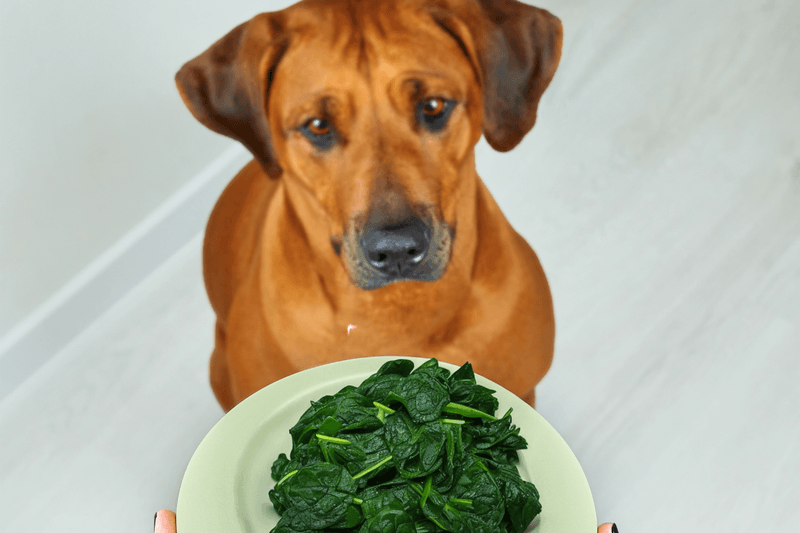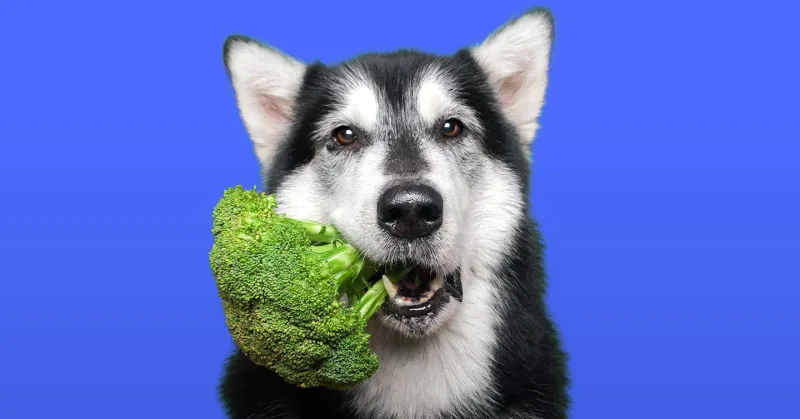Some dogs will eat anything—from your shoes to mystery blobs on the sidewalk.
But vegetables? That’s where things get weirdly wholesome. Yes, your pup can crunch on more than just kibble—some veggies are not only safe, but actually tail-waggingly good for them.
We’re not talking about sad baby carrots tossed as an afterthought. Think crunchy cucumbers, sweet potatoes roasted to perfection, and even green beans that make their tails twitch with joy.
If you’ve ever wondered what garden goodies you can safely share with your furry best friend, grab a snack (for both of you) and dig into this delicious list.
Carrots

Carrots are a delightful treat for dogs, packed with essential nutrients. Known for their crunch, they make excellent low-calorie snacks. Rich in beta-carotene and fiber, carrots support canine vision and digestive health.
Offering these vibrant veggies raw or steamed can enhance their digestibility and flavor. For playful pups, a frozen carrot can double as a chew toy, providing entertainment and dental benefits.
Interestingly, carrots have been a part of dogs’ diets for decades, celebrated for their versatility and health perks. Whether diced in meals or given whole, they remain a canine favorite.
Green Beans

Green beans are a nutritious addition to any dog’s diet. Bursting with vitamins and minerals, they are a low-calorie, high-fiber option that supports overall health. Whether offered raw, steamed, or canned, they retain their nutritional integrity.
Beyond their health benefits, green beans are a fun, crunchy snack that dogs often enjoy. Their natural sweetness and satisfying texture can entice even the pickiest eaters.
Fun fact: Green beans have been cultivated for thousands of years, cherished for their versatility and nutritional value. Dogs can benefit from this ancient vegetable.
Sweet Potatoes

Sweet potatoes are a beloved staple in many dog-friendly recipes. Their natural sweetness and rich texture make them a delightful treat. Packed with vitamins A and C, they promote immune and skin health.
Served cooked and mashed, sweet potatoes are easily digestible. They can be mixed into meals or offered as a standalone snack. Many dogs find their taste irresistible.
Did you know? Sweet potatoes were first cultivated in Central America thousands of years ago. Today, they remain a popular choice for health-conscious pet owners seeking nutritious options for their furry friends.
Peas

Peas are small but mighty in nutritional value. These tiny green powerhouses are rich in vitamins, minerals, and antioxidants that support your dog’s health. They can be added to meals or offered as a treat.
Whether fresh or frozen, peas are easy to incorporate into a dog’s diet. Their natural sweetness and tender texture appeal to many dogs, making them a popular choice.
Interestingly, peas have been a staple in human diets for centuries and are now gaining popularity in pet nutrition. Their versatility and health benefits make them a fantastic addition.
Spinach

Spinach, often dubbed a superfood, offers an abundance of nutrients for dogs. Rich in iron, calcium, and vitamins, spinach supports bone, muscle, and overall health. It can be served steamed or finely chopped in meals.
Though its taste may not appeal to every dog, many appreciate its nutritional benefits. Mixing spinach with other ingredients can enhance its palatability.
Did you know? Spinach’s origins trace back to ancient Persia and it’s been a dietary staple for centuries. Today, it continues to be valued for its health-boosting properties, extending even to canine diets.
Broccoli

Broccoli is a powerhouse vegetable, packed with vitamins and antioxidants. This crunchy green veggie supports your dog’s immune system and offers anti-inflammatory benefits. It can be served raw, steamed, or roasted.
While some dogs enjoy broccoli’s unique taste, others may find it a bit strong. Introducing it gradually can help them adjust to its flavor.
Fun fact: Broccoli originated in the Mediterranean region and has been cultivated since Roman times. Its long history of use in human and animal diets speaks to its enduring appeal and nutritional value.
Pumpkin

Pumpkin is a fantastic addition to a dog’s diet. Its smooth texture and naturally sweet flavor make it a hit with many canines. Rich in fiber and essential vitamins, pumpkin supports digestive health and regularity.
Canned pumpkin puree is a convenient option, easy to mix into meals or serve alone. Fresh pumpkin can be cooked and mashed for a similar effect.
Did you know? Pumpkins have been a part of North American cuisine for centuries, celebrated for their versatility and health benefits. Dogs, too, can enjoy this nutritious vegetable.
Cucumber

Cucumbers offer a refreshing snack that many dogs love. Low in calories and high in water content, they are a hydrating treat for hot days. Cucumbers provide vitamins and minerals that support overall health.
Their crisp texture and mild flavor make them appealing to dogs. Whether sliced or diced, cucumbers can be served raw and are a fantastic low-calorie treat.
Interestingly, cucumbers have been cultivated for over 3,000 years, originating in India. Their cooling properties and nutritional benefits have secured their place in both human and canine diets.
Zucchini

Zucchini is a versatile vegetable that dogs can enjoy. It’s low in calories and high in vitamins, making it an excellent choice for maintaining a healthy weight.
Whether grilled, steamed, or raw, zucchini retains its nutritional value. Its mild flavor and tender texture are often well received by dogs.
Fun fact: Zucchini is actually a type of summer squash and is related to pumpkins and cucumbers. Its adaptability in various dishes makes it a favorite among pet owners looking to diversify their dogs’ diets.
Celery

Celery is a crunchy, hydrating treat that’s safe for dogs. Low in calories and high in water content, it supports hydration and healthy digestion.
This veggie can be served raw, offering a satisfying crunch that many dogs enjoy. Celery’s natural fibers can also help clean teeth and freshen breath.
Did you know? Celery has been cultivated for thousands of years, originally used as a medicinal plant in ancient times. Its evolution into a beloved snack for dogs highlights its enduring appeal and nutritional benefits.
Bell Peppers

Bell peppers are a colorful addition to a dog’s diet, providing a burst of vitamins and antioxidants. Red bell peppers, in particular, are rich in beta-carotene and vitamin C.
These crunchy vegetables can be served raw or cooked, retaining their nutritional benefits. Their sweet flavor often appeals to dogs, making them a popular snack.
Fun fact: Bell peppers are technically fruits, belonging to the same family as tomatoes and eggplants. Their vibrant colors and health benefits make them a delightful choice for both humans and dogs.
Lettuce

Lettuce can be a refreshing and hydrating snack for dogs. Low in calories and rich in water content, it provides a satisfying crunch.
While not particularly nutrient-dense, lettuce can be a fun treat, especially for dogs who enjoy its texture. Mixing it with other ingredients can enhance its appeal.
Interestingly, lettuce has been a staple in human diets for centuries, known for its cooling properties. For dogs, it offers a light and crisp snack option that’s particularly enjoyable during warmer months.
Cauliflower

Cauliflower is a versatile vegetable that dogs can enjoy in moderation. Packed with vitamins and minerals, it supports digestion and overall health.
Whether served raw, steamed, or roasted, cauliflower retains its nutritional benefits. Its mild flavor and tender texture make it a palatable option for many dogs.
Fun fact: Cauliflower is a member of the cruciferous vegetable family, related to broccoli and cabbage. Its adaptability and nutritional value make it a popular choice for health-conscious pet owners seeking variety in their dogs’ diets.
Beets

Beets are a colorful and nutritious addition to a dog’s diet. Rich in vitamins, minerals, and antioxidants, they support heart health and digestion.
Cooked beets are easier for dogs to digest, and their natural sweetness often appeals to canine taste buds. Offering small, cooked pieces ensures they are well-received.
Interestingly, beets have been cultivated since ancient times, valued for their vibrant color and nutritional benefits. Their history as a staple food extends to pets, who can also enjoy their health-boosting properties.
Brussels Sprouts

Brussels sprouts are small but mighty, offering a wealth of nutrients for dogs. Rich in vitamins, minerals, and fiber, they support overall health and digestion.
These mini cabbages can be served steamed or roasted. Their slightly bitter taste may not appeal to all dogs, so introducing them gradually is key.
Fun fact: Brussels sprouts were named after the city of Brussels, Belgium, where they were first cultivated. Their rise in popularity across human and pet diets speaks to their impressive nutritional profile and versatility.
Asparagus

Asparagus is a nutrient-rich vegetable that can be a healthy treat for dogs. Packed with vitamins and minerals, it supports healthy digestion and overall well-being.
While some dogs may not appreciate its distinct flavor, others find it intriguing. Serving steamed or lightly cooked asparagus can enhance its palatability.
Interestingly, asparagus has been cultivated for over 2,000 years, originally prized for its medicinal properties. Today, its nutritional benefits extend to dogs, offering a unique and healthful addition to their diet.
Kale

Kale is a leafy green that packs a punch when it comes to nutrition. It’s rich in vitamins A, C, and K, offering immune support and promoting healthy bones. Adding a few steamed kale leaves to your dog’s diet can be a delightful treat.
Dogs often enjoy the crunchy texture, and kale can be mixed into their regular meals for variety. However, moderation is key as too much kale can cause stomach upset.
Did you know? Historically, kale was a staple in European gardens during the Middle Ages, prized for its hardiness and nutritional value.

